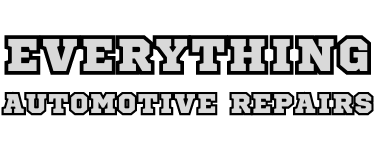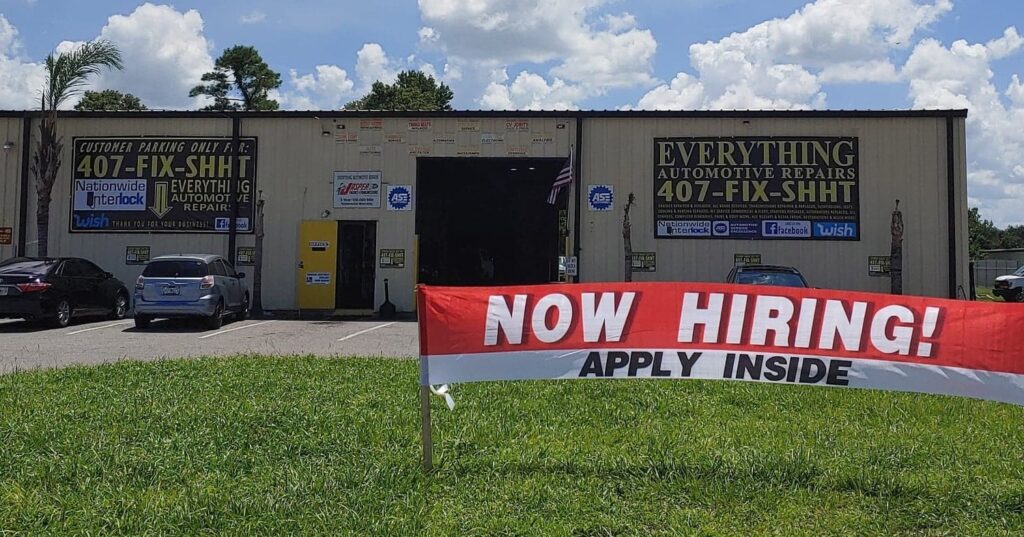Brakes can squeak for a variety of reasons, but continuous squeals and grinding sounds may mean it’s time for new brake pads or shoes. Worn brakes can mean longer stopping distances and difficulty stopping in an emergency situation. Rotors and drums that are too thin may even become over-stressed and break.
Frequently Asked Questions
I want to make sure I’m covered under my car warranty, do I have to go to the dealer to be covered for maintenance?
No. You definitely do not have to complete all your factory scheduled maintenance at a dealer to maintain coverage under your warranty. In fact, by law, as long as you follow the maintenance schedule recommended by your manufacturer, you can have maintenance completed anywhere. At every Everything Automotive, we have the factory scheduled maintenance for vehicles, or bring in your owner’s manual to review with us.
I’ve got an older car, how important is it to change oil as frequently?
An oil change puts fresh oil into your car. More importantly, an oil change takes out the old oil that can become filled with dust, metallic shavings or other contaminants. As your oil ages, outside items make their way in. Without an oil change, this can lower your gas mileage or in the worse case, cause your engine to fail. An oil change is a great preventive step to keep you car running clean and smooth. Make sure to change your oil filter as well, it helps to remove impurities from the oil and the engine.
I’ve heard different things about how often to change my oil. What’s the best guide?
A good rule of thumb is every 3,000 miles for an oil change. However, follow your vehicle manufacturer’s recommendations. They will specify the frequency for an oil change for your driving conditions. The timing of your oil change should follow those recommendations.
How do mufflers actually work? Are mufflers made of special sound-proof material?
Your exhaust system and mufflers in particular is very sophisticated. Technically, your muffler has baffled passages that the exhaust gases move through to muffle engine sound. But if you were to cut away your muffler, you d find some tubes with holes in them. Sounds simple, but inside your muffler, these elements work together to have the sound waves hit one another to reduce the noise. Your muffler is actually a finely tuned instrument.
Besides excess noise and rough idling, what are some other things I need to watch out for with my car s exhaust system?
Excessive rust or broken bolts could cause mufflers, pipes, and other parts of the exhaust system to hang dangerously low, resulting in a hazard for the people driving behind you. However, these aren’t always things that can be easily assessed by just peeking underneath your car. As a rule, we recommend having your exhaust system inspected at least once a year.
Does putting extra air in the tires help a car cope with carrying extra weight?
Definitely. When tires are cold, add five pounds to the pressures recommended by your car’s manufacturer. But don’t overload the car because excessive loads and sharp impacts can cause tire cord breaks and create damaging heat buildup because of abnormal sidewall flexing.
What should you do if the engine temperature gauge begins rising during rush-hour traffic?
Don’t panic. Give the car a little gas to let it rid itself of some engine heat. Turn on the heater, which will draw heat from the engine. If the gauge is firmly in the danger zone, pull to the side of the road and let the motor cool. Most cars shouldn’t overheat–so have the cooling system checked. The problem could be anything from a clogged radiator core to low engine coolant to an inoperable radiator fan
What kind of work is performed during a typical brake job?
Brake jobs include inspection of brake line hoses, calipers, and cleaning and re-packing of front or rear wheel bearings. We also measure the vehicle’s brake rotors or brake drums to specification and replace brake pads and machine rotors accordingly.
What kinds of cars do you repair? Does car make or model matter?
Everything Automotive Repair center provides a ASE certified service for all foreign and domestic cars and trucks. This includes service to all aspects of the car such as engine, emission system, brakes, tires, etc. In addition to servicing privately owned vehicles, we also welcome commercial and fleet vehicles.
What if I need to get somewhere while my car is being repaired?
By consistently proving to be one of the Orange County’s most trusted complete automotive repair centers. Because of this unique relationship, we are able to offer specially discounted rental car rates that are only available to Number One Stop Shop Customers. This provides our customers with the freedom to have their cars repaired and not worry about being stranded at a very affordable cost.
Is there a charge to check out my car?
If the inspection is for a used car purchase, we charge according to the extent of inspection. In the case of a particular problem, a fee may be charged based on the type of equipment used and technician’s time. Often, the inspection fee is partially applied to the cost of the repair needed. If the repair is not completed you can expect to pay for diagnostic time.
How long will it take to repair my vehicle?
Because of the nature of this business, it is difficult to pinpoint a specific time and date for repairs to be completed. Each repair is different, and there are many variables that can effect how quickly a repair is completed. We will always do our best to keep you informed on the status of your vehicle. As the repairs progress, we can give you a better idea of the estimated time and date of completion.
What is the difference between factory new, new aftermarkets, re-manufactured, and used parts?
All four categories have a purpose in making repairs and will be selected according to availability, vehicle specifics and your personal needs. We make a careful evaluation of the cost, availability and life expectancy of the vehicle before making a part recommendation. A factory new part is one manufactured by the company that produced the vehicle. An aftermarket new part is manufactured by a source other than the original factory. A remanufactured part was previously used and is reconditioned to meet or exceed original specifications. A used part has been obtained from a salvage yard.

